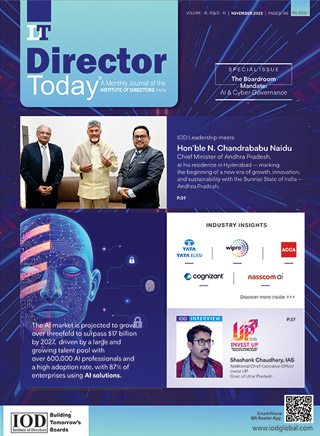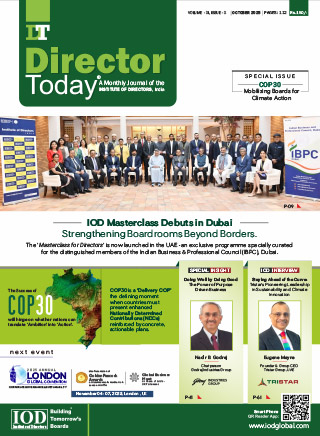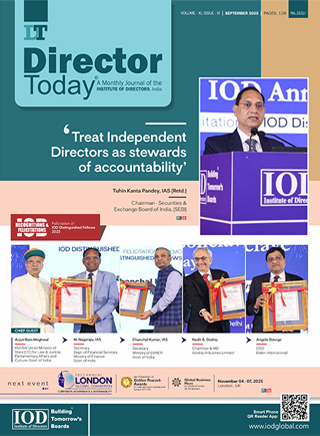IOD Special Talk - Mastering Momentum

Leadership Lessons in Overcoming Challenges, Embracing Diversity, and Harnessing Innovation
Perhaps one of the features we see today in India's landscape is the rapid growth in the economy and in the markets. We see companies expanding at a pace they could not have imagined, maybe a decade ago. The last decade has seen huge expansion and huge opportunities, and promoter directors wanting to capitalize on this cannot do this on their own. The challenges that crop up at scale are of a different order altogether, and for that, specialized inputs are required from people who are independent. Here comes the importance of the independent board member. Of course, to fully leverage the advantages offered by independent directors, the board itself would need to change its outlook.
We don't know everything. Even those who might initially seem less experienced can offer innovative solutions that drive meaningful change and advance our goals.
Let me share an incident from Borosil in 2016. During demonetization, people often struggled to find cash for daily necessities, let alone consumer goods. After all, who would prioritize buying drinking glasses, which everyone already has, when they're struggling to find the cash for daily essentials? So, the Borosil sales team was in a quandary about what had to be done; how do we show the results of the current quarter, that is, the quarter ending December 2016? With the help of the youngsters in our sales team, we came up with a strategy which allowed the company to post 16% growth in consumer goods comprising everyday items bought by housewives in that quarter. How could this be done? All our competitors were down by 8%, 12%, and 14%, while Borosil was up by 16%. The solution provided by the Borosil youngsters was as follows: Those people spending with credit cards as a matter of habit were those people for whom demonetization did not have much impact. And where would they spend it? They would spend it in Large Format Stores like Big Bazaar, racking up their purchases on their credit cards. Our sales team focused their energy on servicing those outlets, and we were thereby able to successfully tide over that very difficult period when people suffered a lot of problems.
I must say that I have been married for 53 years. I have two sisters, three daughters, and my mother with whom we all live. With all the women around me, I must confess I don't understand women, but having admitted that, I must say that they bring a lot of value to the conversation. They bring a lot of value - very sensible, strong, meaningful inputs, - and the sooner men start learning to listen to women, the sooner they'll be happier and more successful. So, given the importance of having a woman member on the board, I want to go on to ask, and why should it be a woman member? The Board can have women members. Of course, at a certain professional level, you lose sight of the gender because they are talking so much sense and with so much knowledge, experience, and professionalism that it no longer matters whether the person speaking is a lady or a man. But they do have other insights that men don't have, and therefore I think this step that we have taken to bring ladies onto the board-again, I'm speaking with reference to ownerdriven companies, or entrepreneur-run companies where it's very important to have ladies who are really competent - they add a lot of value to the business.
To fully leverage the advantages offered by independent directors, the board itself would need to change its outlook.
The next thing that we have been seeing personally is the advent of digitalization, which has been coming in at a pace that is very rapid. So, at Borosil, as a consumer company, we have to protect not merely the identities of our employees, our suppliers, and our buyers, but we must specially protect the identities of every member of the public who buys on our portal. We have been spending crores on cybersecurity. A company which we know well recently suffered a ransomware attack, and they had to be shut down for three days. So, we need to be very proactive on that. We need to have people on the board who are really specialized in cybersecurity.
Then comes the question of artificial intelligence. How do you harness artificial intelligence to do your bidding-to actually even look for fraud within the organization? So, this is opening up a completely new universe. The internal auditor's job can be supplemented with artificial intelligence in a very major way. You can start looking at the prices you're paying for freight rates and so many other services where AI compares things, and we have to bring that to the fore.
Next, we talk about ESG. I met a very interesting gentleman, a farmer who specializes in dairy farming and is a very traditional Indian guy, and he says, “Kheruka ji, are you a Hindu?” I said, “Yes, I am a Hindu.” He said, “Take care. You have to come back after you die. So, the company you run, don't pollute the environment. Don't think that you will die in 10–20 years and then nothing will happen. You will have to come back and face it”. We talk about sustainability and the environment, and but not doing anything about it can cause severe losses. So, we take this very seriously, and this is something where I speak for Borosil: In our company, we examine the environmental standards that are followed in Germany, and we benchmark those standards. We are not content with our own standards: we need to look beyond and benchmark against the more stringent standards. If you do that, you are always ahead of the curve. A French government tender required each component used in their solar module to be sourced from a manufacturer which was compliant to French standards. Their solar glass had to sourced from an environmentally strong company. A French inspector was deputed to inspect our operations, and I was very pleased to learn that he found us to be 22% better than the international benchmark in terms of emissions. This comes from great devotion and great respect for the environment.
Then, of course, we talk about the geopolitical and economic scenario. We've been seeing, especially after COVID, that there has been a huge amount of churn in the working environment. In foreign countries, we see that a lot of people have just stopped going to work. And so, if you go to New York today, you may have to pay more than a thousand dollars, maybe twelve hundred dollars per night, for a room. When I tried to find out what happened, and they said, “We can't find people. So, we have to pay huge sums to the people who agree to work here, and that's why we have to charge large sums from our guests.” So, the landscape continues to shift very rapidly. The options available to people in the nation have grown multi-fold. We cannot find even ordinary workers easily. There is a lot going on, and we must have strong boards with people who have expertise, who have studied, who understand these things, and who can come and advise us to take action before the problem is actually faced.
Next, comes the question of talent acquisition and retention. Acquiring and retaining talent is not easy. We need to have policies where people are attracted to work for you. I'm very happy to say that one of the most striking policies that we implemented actually arose from my son and not from an independent board member. In early April 2021, India had started to face COVIDS's worst phase. One day, my son told me, “Dad, you know, people who come to the factory can't work from home. They have to come to the factory; they have to work here. And I sense the dread in the hearts of their family members, who would much rather see their husband, father, or son leave work and stay at home until he's safe. What can we do? I said, “I agree with you. What are you thinking of?” He said something very dramatic, “What about if we were to pay two years' salary, equivalent to the last drawn salary, to the next of kin of a company employee who would pass away from COVID?” I said, “Yes, that's reasonable.” And then he said, “Education for the children of that employee until bachelor's in a college of their choice or wherever they are capable of reaching. So, the payment of the fees would not be a bar to their education. It would be the capability of the child that would determine what we would pay.” We decided to adopt that policy. And I mean, this became a turning point for the company because suddenly the people and the organisation felt as one with the employees assured that their company would look after them.
I'm very happy to say that corporations around the country, including Tata and Reliance, followed our lead. So, Borosil became a leader there. And again, it's when we have an open atmosphere where we are willing to listen, that I think people can be most effective. We don't know everything, and somebody who doesn't seem to be that smart might come up with a very smart idea that can help change the company or really help us in our cause.
"I'm proud to say that our initiative was embraced by major corporations across the country, including Tata and Reliance, positioning Borosil as a leader in this regard. This success underscores the power of fostering an open environment where ideas are welcomed and valued. We don't know everything. Even those who might initially seem less experienced can offer innovative solutions that drive meaningful change and advance our goals.
Thank you very much.
Author

Mr. Pradeep Kheruka
Chairman, Borosil Renewables Ltd.
Owned by: Institute of Directors, India
Disclaimer: The opinions expressed in the articles/ stories are the personal opinions of the author. IOD/ Editor is not responsible for the accuracy, completeness, suitability, or validity of any information in those articles. The information, facts or opinions expressed in the articles/ speeches do not reflect the views of IOD/ Editor and IOD/ Editor does not assume any responsibility or liability for the same.

 Quick Links
Quick Links
 Connect us
Connect us




 Back to Home
Back to Home































